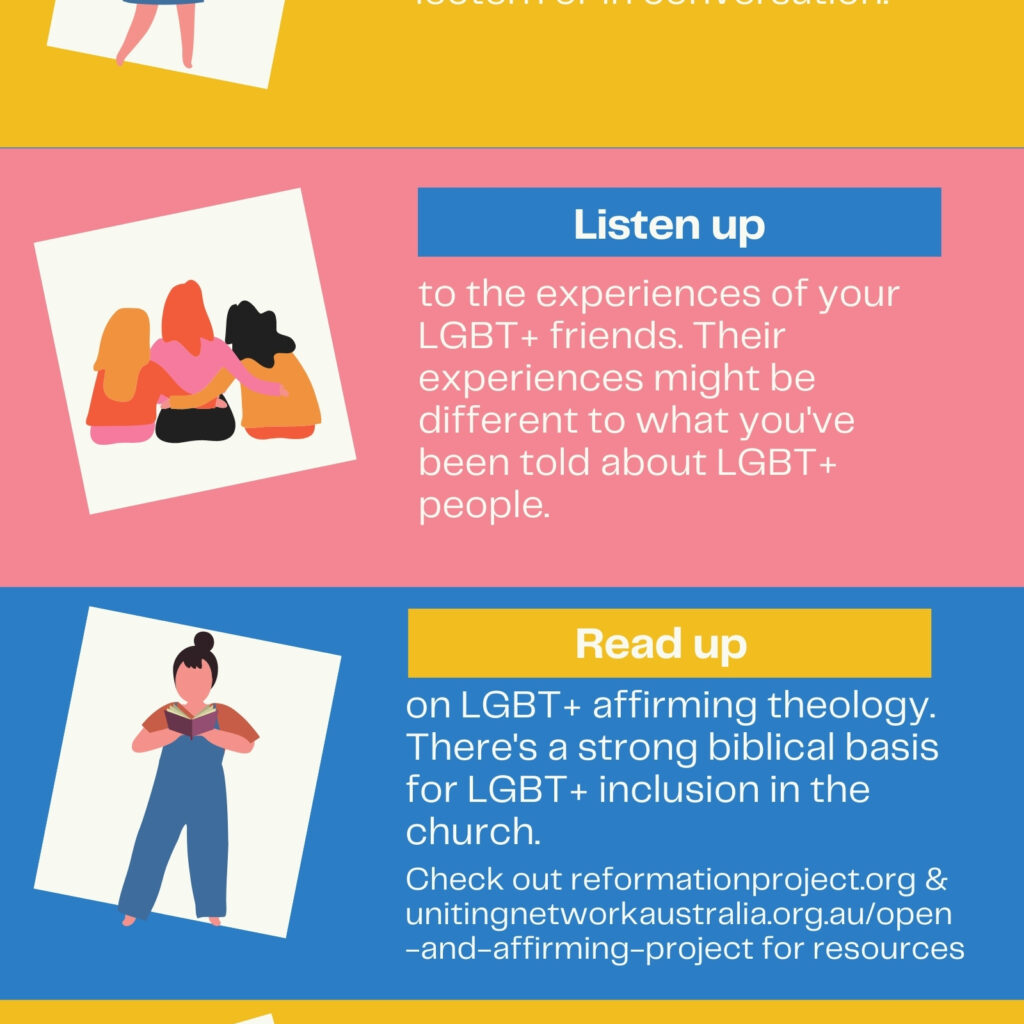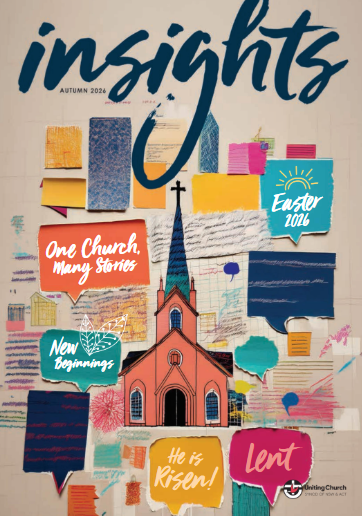The rights of LGBTQIA+ people in religious spaces have been under the spotlight in recent weeks. As a result of often harmful rhetoric in these public discussions, many people with diverse experiences of gender and sexuality are feeling hurt and unsafe.
Citipointe Christian College in Brisbane was recently the subject of public outcry for an enrolment contract containing clauses that could have seen LGBTQIA+ students expelled for being their authentic selves at school, and the contract has since been retracted.
Just this morning, the federal lower house passed the Religious Discrimination Bill, with some amendments. Prior to the vote, UCA President Rev. Sharon Hollis released this statement in a pastoral letter:
“The Uniting Church has urged Members of Parliament not to rush the Bill into law. We maintain the Bill does not strike the correct balance between rights and protections. In submissions to Government, we expressed concerns for the safety and wellbeing of LGBTIQA+ people, people with disabilities, women, and people of minority faith communities, should the Bill be passed in its current form.”
Many churches and religious organisations have released public statements in solidarity with LGBTQIA+ people amid this public discourse. Some are wondering what the next steps are for people of faith who want to ensure that people with diverse experiences of gender and sexuality are safe, welcomed and affirmed in religious spaces.
Uniting Network Australia
For churches that are ready to actively affirm LGBTQIA+ people, a great place to start is the Open and Affirming Project put together by Uniting Network Australia. They are the national network for LGBTQIA+ people and their allies in the Uniting Church, who “proudly participate in helping the Church wrestle with issues of faith, sexuality and membership and work for greater inclusivity within the Church.”
The Open and Affirming Project acknowledges that acceptance of LGBTQIA+ people is a gradual process, and this guide meets congregations where they are and encourages them to take the next step. The purpose of these resources is to equip congregations to “intentionally live out their welcome, in all areas of their life and mission.”
Uniting Network’s resources take congregations step-by-step through theological reflections, having open conversations, and committing to affirming LGBTQIA+ people. They also encourage churches to connect with the wider network of affirming congregations and make their church’s affirming status visible in the community.
The Open and Affirming Project’s emphasis is on taking active steps to demonstrate a congregation’s affirming stance, because not talking about diverse experiences of gender and sexuality in church spaces can still perpetuate harmful ideas that cisgender and heterosexual people are “normal” and that LGBTQIA+ people are not. The project blends biblical commentary, personal stories and practical tips in a way that is approachable for congregations, wherever they are in their affirming journey.
Christian Students Uniting
Christian Students Uniting, a group of university students supported by UCA chaplaincy in NSW, have created this accessible and informative graphic about “Being an ally to LGBT+ people in the church.”
The graphic provides simple actions that anyone in the church can take to support LGBTQIA+ people, such as reading resources, speaking up when you hear harmful language, respecting boundaries, and listening to experiences different to your own. The poster can be displayed in churches as a helpful guide and as a visible symbol of welcome.

Equal Voices
Another action that churches and individuals can participate in is the Equal Voices’ apology. Equal Voices is an alliance of LGBTQIA+ Christians and their allies whose mission is “to connect LGBTIQA+ people and advocates across the Australian church” by resourcing and equipping churches to be “truly welcoming and affirming.”
The Equal Voices website explains why this apology is much needed, due to the past and present harm inflicted on LGBTQIA+ people by the church. The apology also includes a commitment that those who sign it will “honour and support” LGBTQIA+ people of faith, be “open” to correction, “hold others to account”, “promote respectful, inclusive and informed” Biblical discussion, and join with LGBTQIA+ people in the work for “transformative change.”
The Reformation Project
The Reformation Project is another Christian organisation championing LGBTQIA+ inclusion in the church, with a focus on Biblical interpretation. Their vision is of “a global church that honours Scripture and fully affirms LGBTQ people,” and they provide a plethora of helpful resources as well as facilitating conferences and training for parents, pastors, and advocates.
This includes some freely-accessible resources, such as their downloadable Conversation Guides on The Bible and Transgender Inclusion and The Bible and Same-Sex Relationships. These guides take readers through key Bible passages and make the case for inclusion, with principles that ground conversations in relationality and sharing stories.
Secular Resources
Outside of the church, there are also some important resources for how to better respect and understand the experiences of LGBTQIA+ people.
Trans 101 is an online “gender diversity crash course” packed with video and written resources created by trans and gender diverse youth. The crash course takes readers and viewers from the basics of gender identity through to how to be a good ally, including the importance of pronouns.
Twenty10 is an LGBTQIA+ counselling service and their website features an extensive resource library for learning about many different experiences of gender and sexuality. The City of Paramatta’s Multicultural LGBTIQA+ Support Directory is also a great resource for people looking for cultural and religious groups or health and wellbeing services that cater specifically to LGBTQIA+ people with a variety of intersecting identities.
As Rev. Sharon Hollis “noted with sadness” in her pastoral letter, “not all LGBTIQA+ people feel fully welcome and safe across the Uniting Church.”
“I encourage members of the Uniting Church and people of faith to offer prayer and support to those around them who are feeling particularly vulnerable because of the political and public debate taking place.”
“In the weeks ahead, I encourage those who lead worship to think about how they will preach and pray and the language they use that expresses this commitment to the inclusion of all.”
Gabrielle Cadenhead is a mission worker for Christian Students Uniting at the University of Sydney.






4 thoughts on “How to Affirm LGBTQIA+ People in the Church”
Gabrielle, thank you for a great article. Would you be able to share a link for that pink/yellow/blue graphic above? There appears to be some parts at both the top and bottom of the image that I can’t see in this article.
Thanks Gabrielle
Last Sunday, our Gospel reminded us of Jesus’s words ” Do not be afraid! Come and follow me!”
And we did follow – through the Prime Ministers Apology , the National Press Club, issues around the Religious Discrimination Bill.
Then this Sunday ” Blessings and Woes “.
A challenge – and a joy to lead Worship this Sunday!
Thank you Gabrielle for your list of resources.
Thank you Gabrielle, this is very helpful.